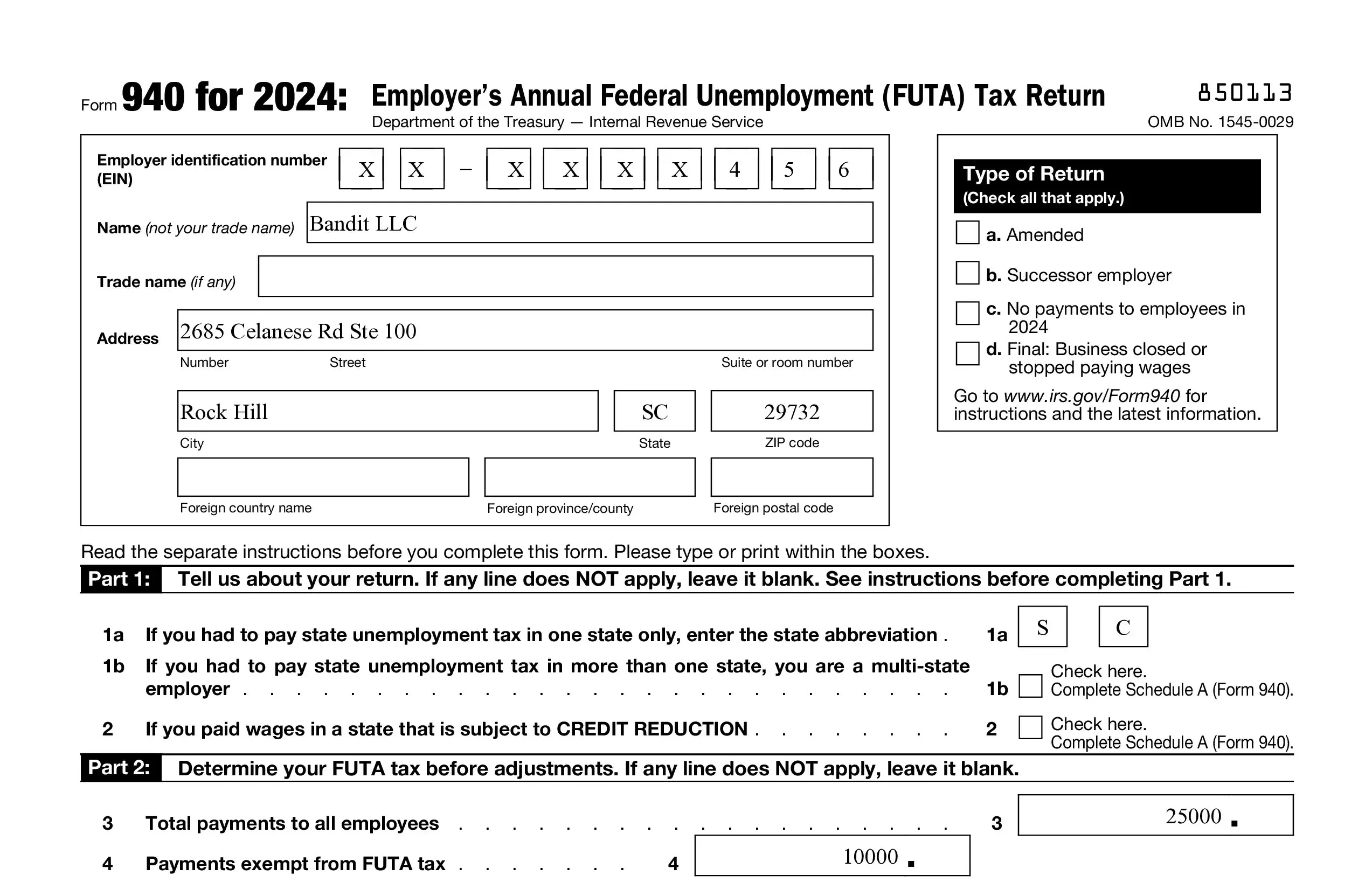IRS Form 940 for 2024: Employer's Annual Federal Unemployment (FUTA) Tax Return
Charles Hardy | Last Updated: March 10, 2025
Share this article
Table of Contents:
- What is Form 940?
- Who must file Form 940?
- What entities are exempt from FUTA?
- What information is required to file Form 940 for 2024??
- When is the 940 tax form due?
-
What is Schedule A on
Form 940? - Penalties associated with IRS Form 940
- Who can sign Form 940?
- How to file IRS Form 940 for your business?
- Home
- Payroll Forms
- What is IRS Form 940
Quick Overview of Form 940 for 2024:
- Form 940: Employer's Annual Federal Unemployment Tax Return
- What’s reported on Form 940: Federal unemployment tax (FUTA)
- Who needs to file: Employer who paid wages to employees
- Filing Frequency: Annual
- When it is due: January 31, 2025


TaxBandits simplifies your 940 filing and tax deposits. See how!
What is Form 940?
Form 940 is an IRS tax form that employers use to report their federal unemployment tax (FUTA) liability on an annual basis. This form is essential for calculating the amount of FUTA tax that an employer owes for a specific tax year.
As an employer, you are responsible for paying FUTA tax on the wages paid to your employees. It's important to note that this unemployment tax is not deducted from employees' wages; rather, it must be reported and paid by the employer using Form 940.

What is FUTA tax?
FUTA (Federal Unemployment Tax Act) refers to the federal tax that employers are required to pay to fund unemployment benefits for workers who have lost their jobs. The FUTA tax rate is 6.0% on the first $7,000 of wages you have paid to each of your employees.
Who needs to file Form 940?
Employers who pay wages to the employees are required to file Form 940. As an employer, you must make FUTA payments if you fall under the following conditions:
- If you have paid wages of $1,500 or more to employees in any calendar quarter during 2024 or 2023, or
- If you have more than one employee for at least some part of a day in any 20 or more different weeks during the year. These include full-time, part-time, or seasonal/temporary employment.
Haven’t made any payments to employees in 2024?
If you have not made any payments to employees in 2024, then check box c (No payments to employees in 2024), sign, and file your Form 940 with the IRS.
What entities are exempt from FUTA?
Certain entities are not required to pay FUTA taxes and file Form 940. These include:
-
Employers of household employees
If you are an employer of household employees, you are required to file 940 only if the total wages paid is $1,000 or more during any calendar quarter.
-
Agricultural employers
If you are an agricultural employer, Form 940 should be filed only when any of the following conditions apply to you:
- If you have paid wages of $20,000 or more to farmworkers in any calendar quarter or
- If you have employed 10 or more farmworkers for at least part of a day during 20 or more different weeks throughout the year.
-
Indian tribal governments
Employees who serve in federally recognized Indian tribal government employers are exempt from FUTA tax, and no Form 940 is required.
-
Tax-exempt organizations
If your organization is listed in section 501(c)(3) and exempt from tax under section 501(a), you are exempt from FUTA. On the other hand, you are subjected to FUTA if your organization is paying wages to employees of a non-section 501(c)(3) organization.
-
State or local government employers
If you have employees working for the state or a political subdivision or instrumentality of the state, then you are exempt from FUTA tax, and Form 940 is not required.
What information is required to file your Form 940 for 2024?
To fill out Form 940, you will need to have this information on hand to ensure timely filing. It is also crucial that you have information regarding your FUTA liability deposits.
- Business Name, legal address
- Employer Identification Number (EIN)
- Total payments made to employees
- Total taxable FUTA wages
- Balance due if any
- FUTA tax liability by quarter (if you have $500 or more for any quarter)
Click here to get the step-by-step instructions to complete your Form 940.
When is the deadline to file tax Form 940 for 2024?
Form 940 is generally due by January 31st each year. Accordingly, the deadline to file Form 940 with the IRS for the 2024 tax year is January 31, 2025.
If you have deposited all the FUTA tax due on time, you may have time to file until February 10, 2025. Check out your
2024 filing and deposit deadlines for Form 940.
What is Schedule A on Form 940?
You are required to complete and attach Form 940 Schedule A if you are a multi-state employer or paid wages for employees in a credit reduction state. This is used to determine your credit reduction information.
You may have heard the term, Credit Reduction, and wondered how it is relevant to Form 940. Credit reduction states have borrowed money from the federal government to pay unemployment benefits but have not yet paid it back to the federal government. Check out the updated credit reduction rates for the 2024 tax year.
Who are Multi-State Employers?
Multi-state employers are required to pay state unemployment taxes in more than one state because they hire employees across more than one state. You will need to indicate that you are a multi-state employer by checking the box on line 1b of Form 940.
Are there any penalties associated with IRS Form 940?
If your business does not file Form 940 on time, the IRS will impose late filing penalties based on how many days your return is late. For more details, read our article about the Form 940 late filing penalty.
IRS Tip:
For filing Form 940, select the IRS-recommended way of e-filing. With TaxBandits, you can easily
E-file Form 940 with the other required attachments.
Who can sign Form 940?
The following individuals are authorized to sign Form 940 based on the type of business entity:
- For a sole proprietorship: Owner of the business.
- For a partnership or unincorporated organization: Responsible partner, member, or officer.
- For a corporation: President, vice president, or principal officer.
- For a Single-member LLC (Disregarded Entity): Owner or authorized officer.
- For a Trust or Estate: The Fiduciary.

TaxBandits simplifies your signature process with built-in Form 8453-EMP, which enables you to sign your return, saving much time electronically.
How to file IRS Form 940 for your business?
You have two options to submit Form 940 to the IRS. You can mail or electronically file your 940 form.
However, the IRS recommends businesses file 940 electronically for quick and secure processing. In order to
e-file Form 940 and manage your unemployment tax filing securely and accurately, you must get started with TaxBandits, an IRS-authorized e-file provider.
TaxBandits provides a streamlined and efficient process incorporating time-saving features, from internal error checks based on the IRS Business Rules to automated tax calculations. Your 940 filing includes 940 Schedule A (for multi-state employers), 8453-EMP, and 940-V. TaxBandits also supports employment tax forms required for your business, which include Form 941 and its supporting forms.
Click here to learn how to file Form 940 online using TaxBandits.
